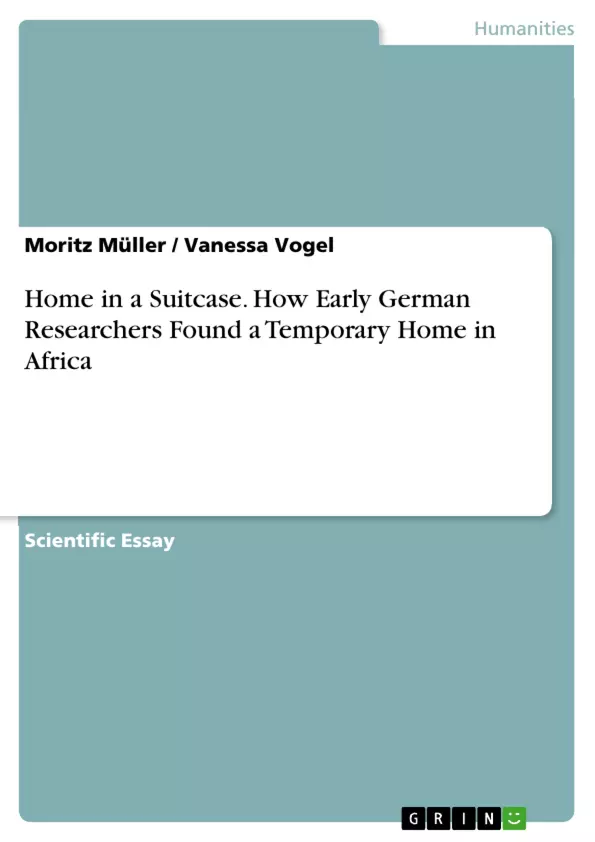In our text, we want to show, how the early German ethnologists and their companions used music, literature, and food to feel safe and home.
Leo Frobenius (1873–1938) is a well-known German ethnologist and until today famous for his extravagant expeditions to the African continent. When he and his colleagues departed for their journeys, they on the one hand satisfied their thirst for adventure, but on the other hand missed their homes and families. So the researchers—among them scientists as well as artists—took a part of their home with them in their suitcases.
While Frobenius and his colleagues took mementos of their home to Africa, they also brought memories of Africa to Europa—in form of photographs, drawings, recordings and material culture. These objects depict (con)temporary visions of a home far away from home.
Inhaltsverzeichnis (Table of Contents)
- Home in a Suitcase
- Finding a Home Away From Home
- Music
- Phonograph
Zielsetzung und Themenschwerpunkte (Objectives and Key Themes)
This essay examines the field expeditions of Leo Frobenius, a prominent German ethnologist, and his use of personal belongings to create a sense of home while traveling in Africa. The essay focuses on the relationship between Frobenius's research and his personal life, as well as the role that material objects played in creating a sense of home in a foreign environment.
- The relationship between research and personal life
- The role of material objects in creating a sense of home
- The use of music and other cultural objects in research and everyday life
- The impact of technology on research and communication
- The complexities of cultural exchange between Europe and Africa
Zusammenfassung der Kapitel (Chapter Summaries)
- Home in a Suitcase: This chapter introduces the topic of field expeditions and examines the importance of objects in creating a sense of home for researchers abroad, using the example of Leo Frobenius's expeditions to Africa. It highlights Frobenius's approach to research, his use of material objects as tools for research and cultural exchange, and his reliance on financial support from the German Emperor Wilhelm II.
- Finding a Home Away From Home: This chapter details the essential items that Frobenius and his colleagues brought with them on their expeditions, focusing on the equipment, clothing, and weapons they considered essential for their safety and comfort. It also discusses the importance of these objects for establishing a sense of home in a foreign environment.
- Music: This chapter examines the role of music in the lives of Frobenius and his companions. It explores how musical instruments were used for both practical and cultural purposes, including maintaining familiarity, creating a sense of community, and engaging with local populations. The chapter highlights the importance of music for Frobenius's research and personal life.
Schlüsselwörter (Keywords)
The essay explores the themes of research expeditions, cultural anthropology, material culture, home, and the relationship between personal life and scientific work. It also examines the role of music and technology in field research and the complexities of cultural exchange between Europe and Africa.
Frequently Asked Questions
Who was Leo Frobenius?
Leo Frobenius (1873–1938) was a famous German ethnologist known for his extensive and extravagant research expeditions to the African continent.
What does the title "Home in a Suitcase" mean?
It refers to how German researchers took mementos, music, literature, and food with them to Africa to maintain a sense of safety and "home" while abroad.
How did Frobenius use music during his expeditions?
Music and instruments were used to maintain familiarity, build community among the researchers, and engage with local African populations.
What role did technology play in his research?
Frobenius used modern technology of the time, such as the phonograph for recordings and cameras for photography, to document African culture.
What did the researchers bring back to Europe?
They brought back memories of Africa in the form of photographs, drawings, recordings, and various artifacts of material culture.
- Citar trabajo
- Moritz Müller (Autor), Vanessa Vogel (Autor), 2020, Home in a Suitcase. How Early German Researchers Found a Temporary Home in Africa, Múnich, GRIN Verlag, https://www.grin.com/document/997529



